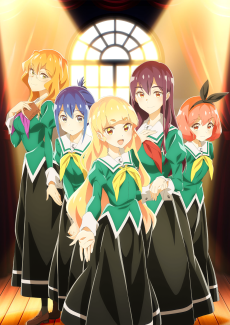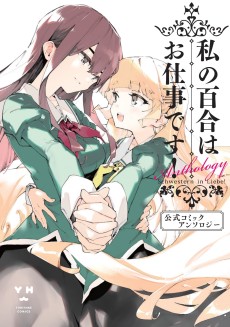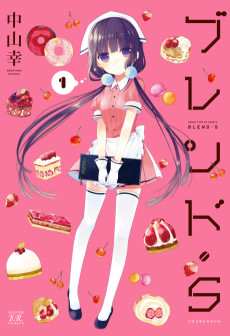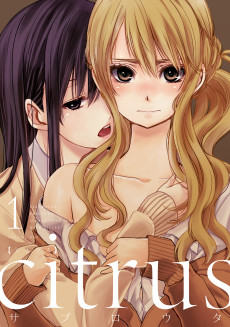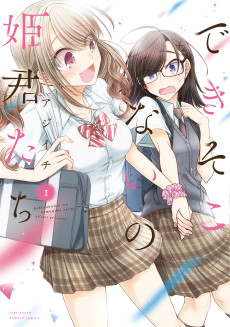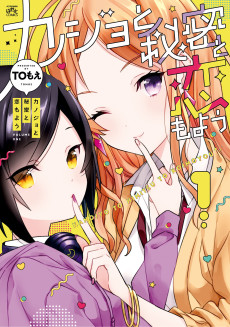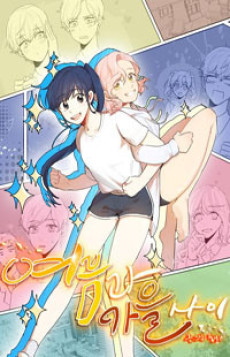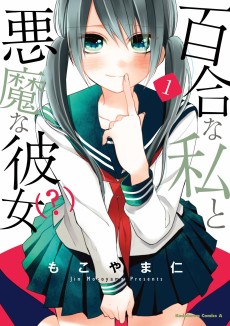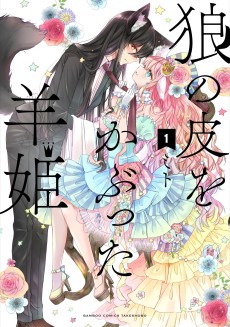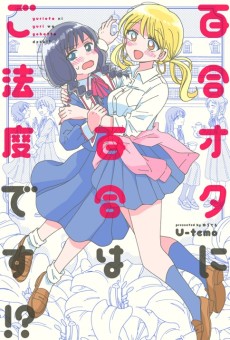WATASHI NO YURI WA OSHIGOTO DESU!
STATUS
RELEASING
VOLUMES
Not Available
RELEASE
Invalid Date
CHAPTERS
Not Available
DESCRIPTION
Hime is a picture-perfect high school princess—she’s admired by all and never trips up! So when she accidentally injures a café manager named Mai, she’s willing to cover some shifts to keep her facade intact. To Hime’s surprise, the café is themed after a private school where the all-female staff always puts on their best act for their loyal customers. However, under the guidance of the most graceful girl there, Hime can’t help but blush and blunder! Beneath all the frills and laughter, Hime feels tension brewing as she finds out more about her new job and her budding feelings…
(Source: Kodansha USA)
CAST
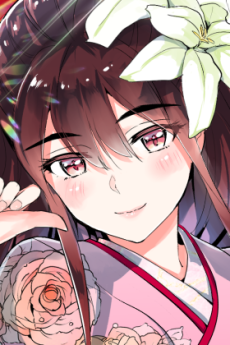
Mitsuki Ayanokouji
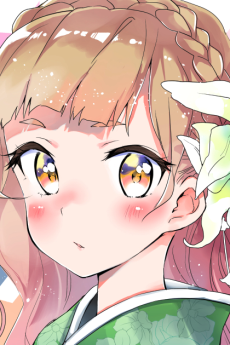
Hime Shiraki
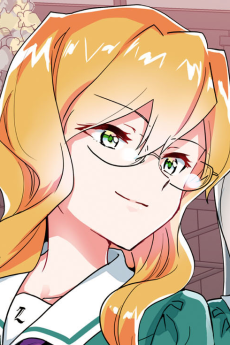
Sumika Chibana

Kanoko Mamiya
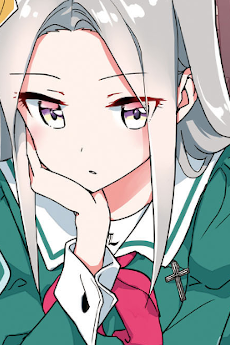
Nene Nishidera
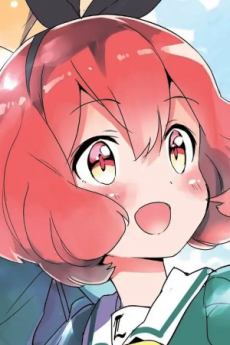
Mai Koshiba
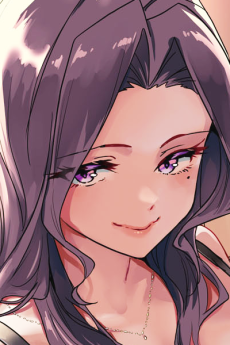
Youko Goto
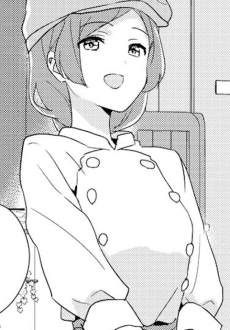
Haruko Shinooka
CHAPTERS
RELATED TO WATASHI NO YURI WA OSHIGOTO DESU!
REVIEWS

lesbunny
50/100"My Job Is Yuri!" is a soul-crushing, homophobic mess. Conservative yuri powered by reactionary, anti-romantic idealismContinue on AniList❧ Not Yuri but it's Yuri
『私の百合はお仕事です!』("My Job Is Yuri!")is deeply homophobic. And it isn't yuri. Or rather, it is yuri. Let me explain. Also, since this is a negative essay it has to be really long or people will get really mad. So please bear with it. It all comes together in the end.
Since the birth of the yuri genre, it was divided into twin opposites:
- Girls showing each other platonic love, or "lesbian in form"
- Girls in actual, real, romantic love through practice and deeds, or "lesbian in content"
♡ Content: Meaning what is being delivered. The actual essence, message, or object.
♡ Form: Meaning how a content is delivered. The appearance and interaction of a thing.
These two opposites are both aspects of the cultural phenomenon「百合」("yuri"). So "yuri" is inherently contradictory in a real sense. Yuri is often taken to mean「レズビアン」("lesbian") because that's a unity of these two opposites. Both aspects can be described as "lesbian" but one only in form and the other in content. That unity is also called「ガールズラブ」(Girl's Love)which covers all intimate relationships between girl characters, gay and straight. In recent Japan, GL has a lesbian romance connotation. Yuri also has a "purely" platonic side「シロマンス」(SisRomance、Sisterhood)at least in symbolism. Historically, Sisterhood type Yuri was used to obfuscate the lesbian content for the level of development of that time's culture, but eventually became a justification for non-romantic intimacy between women in yuri as a whole.※"Romance" in the name means something different. Even so, it's all part of 百合 because yuri itself is a contradiction.
❧ Yuri, Lesbian, GL
The theory of "yuri" is the contradiction of the two opposites. But because of that, the definition of the word itself is a battleground. Because the material, real definition of the phenomenon is a struggle. So in practice, use of the term "yuri" means staking a claim on one side or another. "Lesbian"(レズビアン、ビアン)is a good term for biasing toward the outcome of "Lesbian in content" since this is what the majority of people believe "lesbian" means anyway. How is this possible? Lesbians experience simultaneously the passionate romance of the heart, the lust, and also the platonic care and familial bond with their girls. It's all the girly loves together, mutually interdependent and interconnecting with one another. ※〈In today's Japan, "Girl's Love" preserves most of lesbianism since it's usually romantic. But "lesbian" as a term also preserves the unity of opposites in yuri (form plus content).〉
This dialectical nature of "lesbian" makes it the more all-sided term, but is obviously biased. "Girl's Love"(GL)is a good term for preserving the status quo of the struggle, to pretend not to pick sides.※In Japan today, usually the context is closer to lesbian romance; for English speakers GL is more generic sounding. But since there's a power imbalance between those who own the factories and publishing firms that create yuri manga, versus the rest of the people, any seemingly neutral term is in fact aligned toward existing relations of production and therefore the existing dominant faction. Theoretically, GL is the one-sided term despite appearing to be the most neutral in English (and in fact because it's "neutral")※百合 is the "neutral" for today's Japan. So the problem isn't with the term "yuri" or what essentially is or isn't "yuri" but how yuri is made in the first place and what forces define it.
Girls and boys aren't bound by the same social rules or taboo. It's not impermissible for girls to generally hug, touch breasts, live together, bathe together, sleep together, say they love each other or even kiss. The historical birth of yuri from the Class S literature movement is due to the very fact that its lesbian form suggested—therefore received—lesbian content. So these girl-aligned activities are the formal basis for the yuri genre. Each of these are commonly employed as dramatic devices of the genre when a character is a lesbian. The formal nature of girl's love confuses lesbians and creates unique drama. That's fine, the same drama exists in reality. It's common for a lesbian manga protagonist to hear "I love you" from their girl friends and it hurt even more because they assume it's just platonic straight love. In fact, the formal kind of yuri is often the catalyst for lesbian characters to realize and actualize themselves. The motion of the lesbian content of yuri is actualized love that starts in adolescence like formal yuri, but can transcend adolescence into adulthood. A love that I would say "looks forward" beyond the immediate moments, beyond simple impulse for comfort and affection. So lesbian yuri is forward-looking, is planning, is long-term, is responsible—in essence, it's working-class yuri. It's yuri for itself. It's not short-sighted and driven by base desires for comfort. So I conclude romantic yuri is constructive. Platonic or formal yuri is affordable only to children, students, and the ruling class of society since they lack some working responsibilities. This is yuri for the other, and as such is expected to be abandoned for the other—for a man.
❧ Abandon Yuri
These girl love relationships are expected to be abandoned when girls come of age, so they can start using that experience in love to build a life of 「普通の幸せ」("ordinary happiness"). This getting married (to a man), settling down to a home, having kids, finding a job, that sort of thing¹. The conservative side of it is how it's enforced as a template for a correct path to life and happiness. The reactionary side is how it's used to cut advancements made for women in the workplace to keep them as traditional housewives². This traps both men & women—and the whole of straightness—as a result. Lesbians are a direct threat to the conservative and reactionary side. So conservatives are set against lesbians in content. Usually, we see them as set against lesbians in form, too. This is a problem deeply rooted in class relations.
Conservative "ordinary happiness" is something useful to the class warfare of our modern era. In this particular analysis, manga is created by working-class people in service to the profits of the monopoly class. Manga as a whole is a publishing industry defined by its mass-production for the purposes of mass-consumption. It may seem like "manga" is just a type of silly picture book. But that's Manga's commodity form (a thing bought and sold at market), not its actual essence. Manga's twin nature is to dutifully serve the profits-in-command structure of monopoly capitalism; and saturate culture with the hegemony. Hegemony is basically cultural monopoly. So twin monopolies: one over production (finance), one over culture (hegemony). Culture is made up of its two component parts: material culture and spiritual culture.
♡ Material culture: The material goods that serve as the basis for culture. Books, bibles, artifacts, clothes, etc.
♡ Spiritual culture: The goods produced by relationships which serve as the interactive form of culture. Beliefs, values, etiquette, correct behavior, morality, etc.
Material goods, as the basis for culture, are also produced by the basis of society itself: the workers, factories, printers, publishing firms, manga artists, etc. All the labor and machinery (together: the means of production), and the whole of the relationships to production. Together, the means and relations of production are the foundational basis of society.
Spiritual goods are produced by the over-arching structure of society: mediators like the State, the great masses of the people, educational institutions, scientific research, art, family life, law, media, politics, religion, philosophy, etc. The whole of the spiritual (cultural) relationships. The structure of all these things primarily maintains the basis of society. It sometimes shapes that basis.
The basis primarily shapes the structure of society, but sometimes maintains it. The basis is dominant though, since it also produces all the food and housing we need (actually, all needs!). You can't eat manga, after all. But since spirit is the interconnections of humanity and mankind is social, we have spiritual needs too. Manga is saturated enough to count as a type of satisfier of mass spiritual needs. That means it has a serious responsibility to be healthy for the people who consume it.
But when the culture is dominated by old fucks who want to maintain existing relations to production* (conserve the status quo), then it often produces unhealthy spiritual goods. Remember, the structure of society produces spiritual goods to maintain the basis of society. Monopolists own the basis in most countries (including Japan). And until a Revolution, they own the structure too. The spiritual culture to "abandon all yuri" (when you come of age) is one particular example of this. The ruling monopolists need the whole people to faithfully reproduce society: that is, working for wages in an exploitative system so worker's labor can be extracted as profit for the rulers. This social reproduction is the root of all conservatism. It's not identical with biological reproduction, since social man reproduces socially not biologically (though it doesn't stop asshole conservatives from arguing over "biology" and in essence reduce humanity to mere beasts in heat).
But the society advances according to its necessities and moves away from exploitation with each Revolution of the productive tools (like factories, robotic assembly, computers, etc). The ruling monopolists therefore also need reactionaries who destroy the advancements of society to prevent and "reset" the crises of Capital. The most extreme reactionaries—fascists—conduct a false revolution by firing up the people against targets other than the ruling monopolists. Example: against homosexuals. There's a pressure created by the revolutions in the tools to change society for the betterment of everyone. The aim of fascism is to relieve the boiling build-up. It only serves the monopoly class.
Fascism is particularly dangerous to the health of the society. It destroys everything around it including itself. That's its role, after all. But more importantly, it serves as a completed bridge between all reactionary spiritual culture and the need to destroy the revolutionary tools and workers of production. They fire people up. They use reactionary culture to inspire hate against the people and the basis of society. The basis of society itself doesn't form any kind of reaction. In capitalism, the base is constantly undergoing revolution in the tools of production just to meet the rising need for competition. So the reactionary structure is actually the very seed of fascism! Without it, no 'bridge' can be built into destroying the base and further impoverishing people. Why talk about all this complex social bullshit? Because this bullshit is particularly everywhere, including manga. In fact, manga is such a mass-produced and highly saturated form of spiritual good, it's loaded with all sorts of cultural seeds.
Some manga are conservative, some reactionary, and some wholesome. Working class people have to make do with what we got, after all. So we feel the intrinsic duty to curate the material culture into the future spiritual culture. That's why we read manga, discuss it, share it, become passionate about it, get invested in the stories and the art. All of these are needs and duties, which would otherwise be exercised in television, film, religion, or other parts of the society's structure. So regardless of the medium, it's a human duty to become invested in what we might sometimes call silly, trivial nonsense. Sure, it's silly nonsense. But it's silly nonsense that shapes and conditions how we think about one another, how we communicate, how we speak, how the heart develops and grows, how we mature, how we come to know society and each other, how we come to know and love ourselves, and how we love one another. So to sum up, our reviews and discussions of manga (like this one) are an act of love. And yuri is a particularly love-based genre! So the consideration of what is conservative and reactionary within the human spirit of love itself is materially important to everyone.
1: Quote from my anonymous friend
On "ordinary happiness":
「普通の幸せ」はいわゆる「いい大学に行っていい職に就いて、結婚して子供と家を持つ」というような人生設計を指していると思います。
ですが、私の知る限りだとこのフレーズはもはや親世代が子供に無自覚のプレッシャーをかけるためか、あるいは椰揄するような文脈でしか使われなくなっているように思います。
「普通」や「当たり前」といった主語を大きく取るような表現が極端に嫌われている流れももちろんあるとは思いますが、最近の若い人達の間で、「普通の幸せ」をポジティブなニュアンスで使ってるのはSNS上でも現実でも、少なくとも私は見たことないですね。私の視野が狭いだけかもしれませんが……2: Example from manga
『親がうるさいので後輩(♀)と偽装結婚してみた。』(My Parents Are Picky, So I Faked Marriage With My ♀ Junior)
Boss at a finance firm wants to give management of client's account to a man instead of the woman protagonist. Because the woman will inevitably marry a man, quit, become a housewife, and thus vital job experience will be wasted on her. He says give it to a young man instead, since he'll stay with the firm, increase his capabilities, and keep working hard for them.
❧ Yuri in Form
"Lesbians are awesome!" Says this manga...or something like that. Great, so we're done here. It's yuri, it's lesbian, and the artist is a goddess...wait. There's a problem. The whole story spits on lesbians while only paying us lip service. All the characters say good things about lesbians: that they're fine, they're not hurting anyone by existing, they're not disgusting, they should be defended, lesbian artists make beautiful gay art, "have you heard of the『Class S』movement?", the straights aren't afraid to undress and bathe with lesbians, Liebe academy is based on lesbian-origin Class S literature, there are confessions and kisses, and lesbian sex! All seems perfect right? The problem is, that's the form not the content. Remember, if the form is lesbian but the content isn't, it's actually conservative yuri at best. If we look at what happens concretely: every single lesbian fails, continues failing, and is set up to be deeply hurt at every possible opportunity.
Every. Single. Time. If any lesbian can be hurt in a situation, it's designed to hurt her as deeply as possible for that situation. She confessed? It's actually to a straight girl, or was bait to be used against them. She kissed? It was one-sided and not reciprocated. She's dating? It ends in flames, and was a poison relationship anyway. She lives boldly as a lesbian? That's only because she's a horrible witch who just manipulates everyone, good girls stay quiet about being gay or they get hurt. She had sex? It was all just for fun anyway, the love was a lie, so it goes up in flames. She's accepted for who she is? Nope! Actually, the secret condition was she had to not be a romance-wanting lesbian.
This is the single most thorough, most twisted and advanced attack on my lesbian sisters that I've ever seen. It's almost too perfect for a straight person to write. It's like it's written by someone who knows exactly how to hurt us and never relents from doing it. It bypasses all the weak conservative nonsense no one listens to anymore, like the list of "good lesbian things" I opened with. This is a highly sophisticated attack and I can't see it as anything else. In 51 chapters with several dozen omake of extra content, that is all that happened to lesbians. Not a single person is happy who has articulated as being attracted to girls romantically and sexually. Mai is happy. Sumika is happy until she starts getting lez feelings. Hime is happy. The one major time Hime wasn't happy was when she got confessed to by a lesbian and it destroyed her.
There's a thin plot thread about Hime coming to like Mitsuki's hot body, but it's been dropped for a while. And it was weak to start with.
❧ Subjective in Style
In manga, the most common style is the a subjective, protagonist-based style. The reader is drawn into the world and story through a person's eyes and thoughts. Readers can read their speech, body language, expressions and also read their mind. The same style is used for "Yuri Is My Job!". Hime isn't a lesbian. That's a fact. It's established early and reinforced often. At every major decision involving love, romance, girls, touch, etc, Hime chooses the non-lesbian path. Meaning, she practices the content of someone without romance or sexuality. This is a common writing device for yuri: one character is lesbian (the protagonist), one is empty (usually the love interest). Sometimes the roles are reversed, but a yuri manga with a main subject who isn't a lesbian treads conservative waters if it goes too long.
"Yuri Is My Job!" certainly swims up a conservative river in this respect. The result of the writing device is usually, the lesbian fertilizes the romantically barren garden of the other girl until she begins to bud her own internal lesbian-ness. So the device can be used for a real lesbian (practicing lesbian, one in content). But if the garden remains forever unblossomed, then its flowers are fake. This is the "pure" yuri, lesbian only in form. A common phrase to describe this is "it looks like one thing but it actually is another".
❧ Homophobic in Content
♡ THIS SECTION IS FILLED WITH SPOILERS FOR VOLUME 7
When Hime rejects Mitsuki, her own thoughts indicate she's not gay. She specifically sought platonic love from Mitsuki. Hime methodically drew Mitsuki into a sense of security and vulnerability with her confession, expected to hear "I love you", yet still the reader is supposed to believe "of course Hime meant platonically"? No. No sane and stable person considers warmly and carefully baiting an "I love you" confession to mean "I love you platonically". Furthermore, the reader's first subjective experience is from Mitsuki's side, not Hime's. What we actually see is Mitsuki being asked to confess her love, doing it, then kissing Hime. Hime is surprised but smiles brightly about it. Afterward, we follow Mitsuki in her post-confession bliss. It's clear she feels accepted in a way. Then Kanoko, a random lesbian classmate, and even Sumika all independently construct a narrative that Mitsuki confessed one-sidedly. Why? Because Hime quit her job suddenly. The audience is led to believe Hime quit because Mitsuki admitted (post-confession) that she had Mai lie about her arm injury to keep Hime longer. That's the exact moment in the story when Hime's face goes dark about Mitsuki. So Kanoko (as usual) is just batshit insane, hurling verbal and physical abuse at Mitsuki for being one-sided and "selfish". It's later revealed those horrible abuses were correct! Hime quit and started avoiding Mitsuki because she didn't want unrequited romance between them. She barely even considered Mitsuki lying about the injury to be a problem. Which is a much bigger problem since it's completely against Mitsuki's character.
There's a recurring theme in the story that romance is inherently selfish and disgusting. Lesbian romance is a kind of romance, so this is an example of an actual contradiction of content to form. The story says lesbians aren't disgusting. But then says romance is disgusting, which lesbians require to articulate as lesbians! Anything less isn't lesbian in content, it's purely lesbian in form only, which is the conservative side of yuri. The anti-romance theme is enforced most extremely by Kanoko and Sumika. They act like romance cops for much of the manga, trying to stop anyone from getting too lezzy. They both think romance is poison to a higher kind of relationship. It's negatively reinforced through Mitsuki, Nene, Youko, later Sumika. It's reinforced passively from Hime and the rest of the cast who don't bother with romance (Mai, random lesbians who stay in the closet). So many of the characters are so horrible they're just hateable.
So in essence, this is the reactionary favoring of Plato's love over "Eros" (romantic, erotic love). Plato explores the concepts of love in Republic, Symposium, and Phaedrus. In Symposium, Aristophanes makes the case that people begin as a soul connected in a single body, which is later split into two bodies. His explanation is meant to be comedic metaphor. Aristophanes essentially argues that straights, gay-men, and lesbians are who they are because of their division from some initial unity. In a way, he's not wrong. But because Plato's works are presented from idealism, they have no grounding in reality on their own. However, "Yuri Is My Job!" seems to agree with Aristophanes on the question of sexuality's form. It has no problems with the existence of lesbians as an abstract ideal, but does nothing to accept real lesbians as a practice.
Later in Symposium, Alcibiades is a man who loves Socrates, both sexually and intellectually. But because Socrates only gives platonic love, Alcibiades' affections, lust, pride, and immoral advances cause Socrates to give up on teaching teaching him. Remind us of anything? Hime is Socrates, Alcibiades is Mitsuki. Which means giving up on personal time together and friendship. Socrates is meant to be the character through which Plato speaks by critique of the popular beliefs of his time. Alcibiades represents wanton erotic love which destroys platonic love. And so too destroys all forms of love (including friendship) with those who practice the "higher" (platonic) love. "My Job is Yuri" is deeply ingrained with the same ideology.
So this is a yuri that makes a concrete statement in general: lesbian romance is inherently disgusting; deeply deserving of failure and destruction; poison to platonic love; and platonic love is the highest form of love. To fairly analyze this premise of the manga would require the manga to fairly attempt it in the first place. But it doesn't! Instead, every character is tricked into following their passions and then hurt for it (or hurts others, which in turn hurts them). Everything that is poisoned or goes down in flames is manually contrived by the author themselves, not the natural unfolding of irrefutable social forces in the story. The net result is lesbians are one-sidedly painted as emotional raging rivers, unable to control the destructive force of romance that wells up inside them. The message is: Good girls suppress their emotions. Good "lesbians" suppress their carnal desires toward girls. Girl's Love! But not that kind of love. But not because you're a lesbian or anything! Lesbians are good girls. Until they want romance or sex. Then they're witches who destroy everything. Summed up, the homophobia here is "Lesbians should stay in the closet".
Real love (as opposed to abstract, idealist "love") can't be real unless it actually exists, embedded in the material and spirit of society. Love is built between people over time in their shared relationships. This manga forgets that love is shared. Instead, the manga paints love as something individualistic and subjective, something felt by the individual. It's so concerned with aligning the type of "love" between the girls that it misses the forest: love is a unity of all its forms. Erotic, romantic, platonic, friendly, mother, daughter, wife, sister, religious, patriotism, humanity—all love. To partially negate any abstract form of love in reality requires destroying the people who do the loving itself. Sane people don't seek to destroy the love between sisters, wives, mother-daughters, friends, and love for the whole people. Why should any sane person with an ounce of humanity in their soul concede to destroying romantic and erotic lovers? Why should this ideology be taken as anything other than deeply homophobic and anti-human? This is a thoroughly reactionary ideology.
❧ Concrete Examples
♡ THIS SECTION CONTAINS BASICALLY NOTHING BUT SPOILERS FOR VOLUMES 7~11
Notably everyone who isn't attracted to girls? Happy. Fulfilled. One girl changes into a lesbian mid-series and immediately becomes miserable (Sumika). So now everything is set up to do maximum damage to her. This series is actively hostile to every lesbian. The message is clear: The only good yuri is pure yuri, untainted by the disgusting stench of romance, according to this manga. So the only good lesbian is a lesbian in form, untainted by its content. That's also what Sumika believes. She's the one who eventually realizes she's gay. I'd like to think the author doesn't use her own direct ideology in this character but it's too late for that. They already did it with the bold lesbian who is oh-so-horrible (Youko).
Kanoko is an unhinged garbage person who tries to actively ruin lesbians. She has no problem hurling verbal abuse at anyone she remotely perceives as a "threat" to her being with Hime. And be with her in a non-romantic way, even though she's a lesbian. She has accepted the author's implicit endorsement of the wrongness of romance, so she's given the following special powers: see the future like an oracle, read peoples' minds, curse at anyone with no negative consequences, hit people without negative consequences. In fact, she's coddled for the entire series by Hime and Sumika. Notably, those two girls also embrace the "romance is destructive" ideology of the series. Of course, Kanoko isn't explicitly made a psychic or socially invulnerable. But this is the outcome of her actions every time. Once she (using her plot mind-reading powers) learned Sumika is in romantic love with her, Kanoko wasted no time in setting up a trap for Sumika. Her defining characteristic is to peddle the manga's ideology and always be right, no matter how horrible she is.
Nene dates Youko and even has sex with her. So progressive! But of course, the following morning, they have to break up again. Why? Because Youko is horrible, as usual. She's just using Nene for her body and fun. This is a typical conservative point about lesbians. Since none of them believe lesbians can be serious women in content (or if they are they're a severe threat), they paint lesbians as raging emotion-machines who only care about instant satisfaction. Specifically, adult lesbians (of form) are the bad girls who didn't give it up after adolescence, so it turns into an instant-gratification life style decadence and destruction. They're shown to be impulsive and not forward-thinking. Of course, that's true of anything which only is itself in form, but not in content! But here, they've falsified reality. Lesbians are lesbians in content, not only in form. They're not playing at love long past adolescence. Nene's defining characteristic? She serves as a lesbian to be foiled. She purely exists to become hurt in a backstory, be put on ice (and not find love for years) and then only thawed again when the story deems it necessary to hurt another lesbian. She is exclusively brought back into relevance only in terms of her pain, and only in terms of creating new pain for her, then shoved back to the kitchen! That last point coincidentally makes it look like Nene is receiving corrective punishment into becoming a trad-wife, for daring to be a lesbian as an adult.
Youko finds out Nene is in love with Sumika (who was presumed straight at the time). So she proposes to be temporary girlfriends while Nene waits in vain for Sumika to blossom. But Youko has a real life in academia and work, so she doesn't stay at a dead-end service café. This is framed as inherently destructive. It's achieved by getting the reader to systematically accept the importance of every individual in Liebe Girl's Academy café. The reality is if Liebe fails, it's due to its own internal problems. Specifically, Mai's (owner-manager) problem of being overly reliant on her skeleton crew maintaining perfect acting for all time. So when Sumika's perspective is one-sidedly given to the reader about Youko, the reader is forced to conclude Youko's a horrible person, even if Sumika is wrong about romance in general. She's painted as the villainess in an otome game. Like a villainess, Youko's defining characteristic is: nothing she says is disagreeable but the net result of everything she does is tear down other people and all relationships. That sounds like a perfect way to sum up the series as a whole: it never says anything you can find homophobic but everything that actually happens is disastrous for lesbians. So the net result is, it's homophobic. Specifically to the reader.
❧ Conclusion
『My Job Is Yuri!』 is a soul-crushing homophobic mess. The manga artist favored soapy drama and heartache at every turn. There are few rest periods from the pain. More deviously, the story is built to repeatedly draw in the heart of the reader so it can be stabbed. The trick only works scant few times for those with fulfilled hearts. But I worry for those with unfulfilled lesbian lives. The artist, 未幡先生(Miman-sensei)is a woman according to her profile. But I personally don't care about the author's own subjective standpoint in regards to whether the output is homophobic. For the purposes of the conclusion here, it doesn't make a difference if they're man, woman, neither, both, or if they're gay, straight, bi, lesbian, asexual, whatever. Because the reality is the author is not the sole author of the work.
Works can't be separated from their creators, but creators can't be separated from their society, their historical era, their culture. And no work can be separated from its relations to production. Even the most 'progressive' lesbian author will draw upon her society for her work, and her society will control the outcome of that work. That always leaves room for conservatism and reaction to enter manga. It means even a lesbian can create something homophobic which is unhealthy for the soul, even when they don't mean to. In the final analysis, "My Job Is Yuri" is reactionary, homophobic, sentimental trash. The more I read, the more I felt yuri itself slip backward into the 1970s era of lesbian tragedy.
I wish 未幡先生 the best of luck in the future and I hope she continues to succeed at all the manga she makes. Thank you very much to 未幡先生 for providing us with this story which I could read, enjoy, despise, hate, love, cry, hurt, and try to connect with others through. It may not seem like I appreciate her work, but didn't I already say this is all an act of ♥ love ♥ ?
Score: I haven't found a way to omit a score from an essay like this. Even putting a "0" truly rates the work 0/100. So I've changed the score to a neutral 50.
SIMILAR MANGAS YOU MAY LIKE
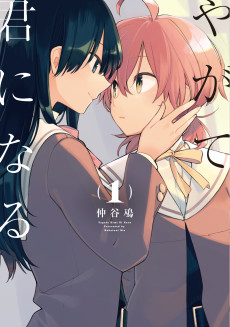 MANGA DramaYagate Kimi ni Naru
MANGA DramaYagate Kimi ni Naru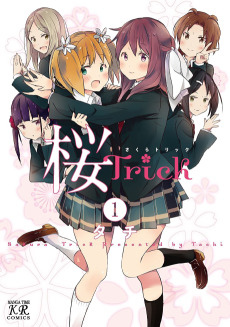 MANGA ComedySakura Trick
MANGA ComedySakura Trick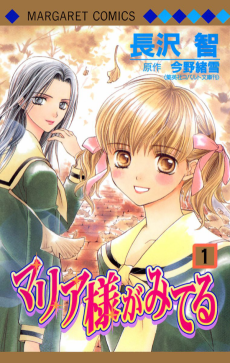 MANGA ComedyMaria-sama ga Miteru
MANGA ComedyMaria-sama ga Miteru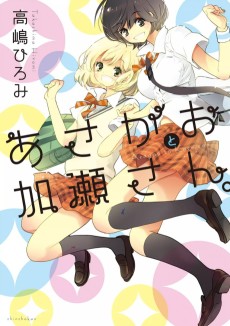 MANGA RomanceKase-san Series
MANGA RomanceKase-san Series
SCORE
- (3.65/5)
MORE INFO
Favorited by 179 Users
Hashtag #わたゆり


